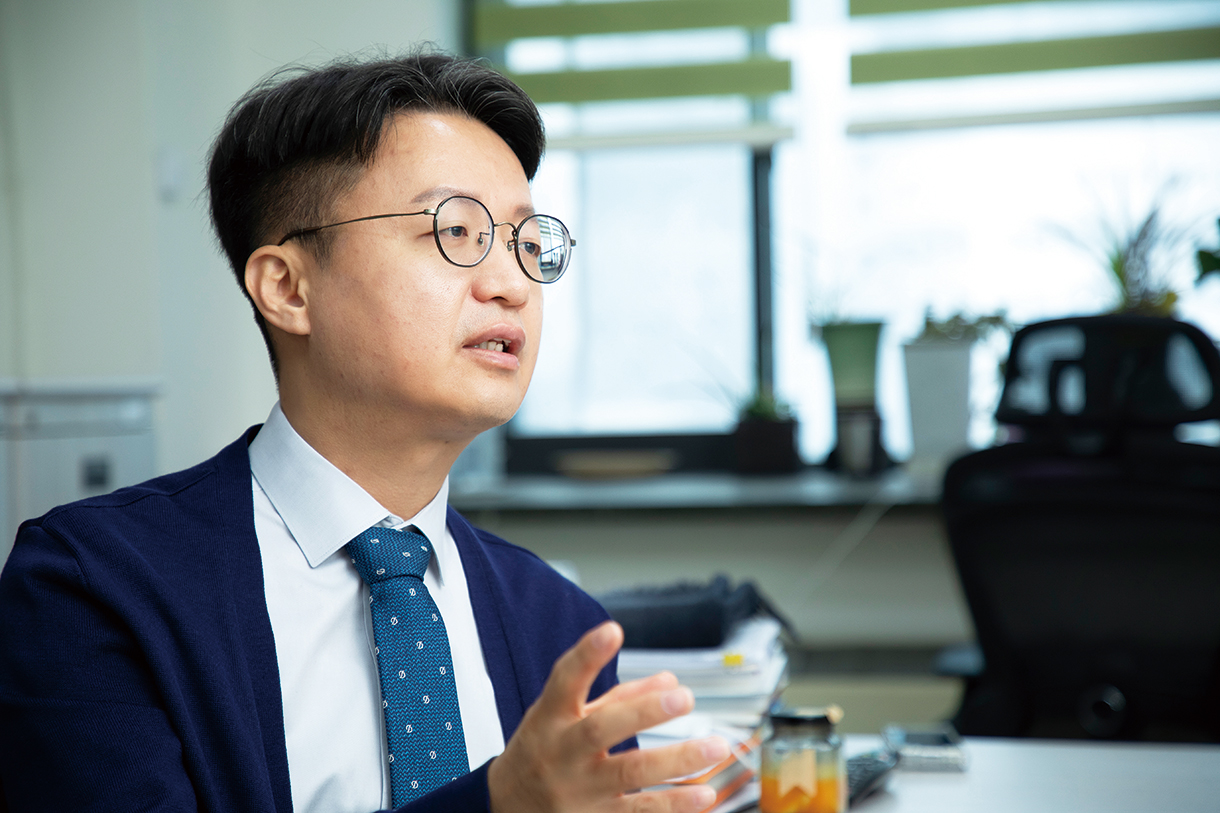

Story
한국 반도체 산업,
위기도 기회도 AI 시대에 있다
Korea’s Semiconductor Industry:
Both Crises and Opportunities Exist in the AI Era
일반대학원 인공지능반도체공학과 주임 정재경 교수
(융합전자공학부, 반도체나노소자연구실장, 디스플레이반도체공학연구소장)
Jae Kyeong Jeong, Department Chair of the Graduate School Department of Artificial Intelligence Semiconductor Engineering
(Department of Electronic Engineering, Director of the Semiconductor and Nano Device Lab, and Director of the Information Display and Semiconductor Research Institute)
- 글 김현지
- 사진 이현구
- Writing Kim Hyun-ji
- Photograph Lee Hyeon-gu
Scroll Down
As we move into the future, innovative technologies become the distinctive competitiveness between companies and nations. And it is always people who stand at the center of it all. If Korea wants to lead the semiconductor industry in the AI era, it is essential to have talents with exceptional expertise in AI algorithms, semiconductor design, and innovative devices. Hence, Hanyang University is at the forefront of training AI specialized talents in the AI era.
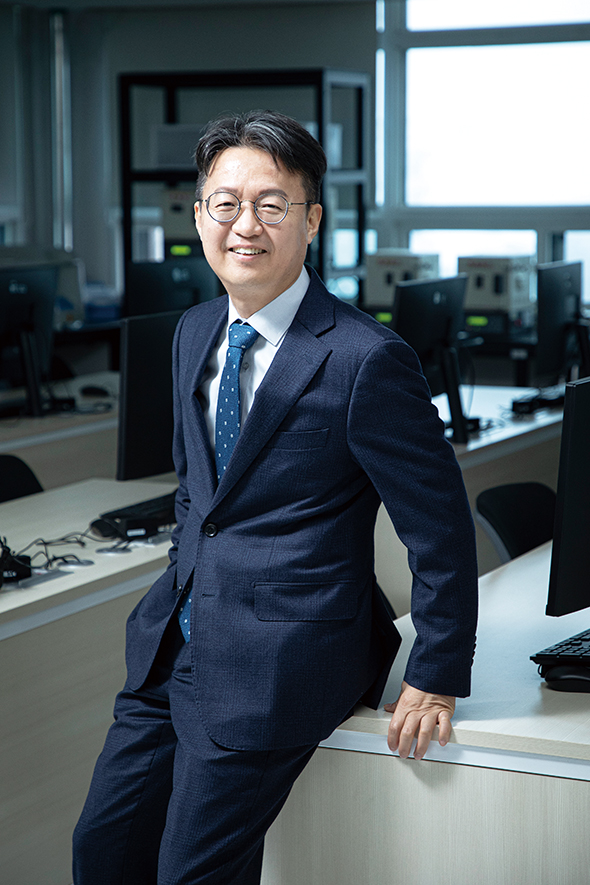
세계 경제 패권을 좌우할 AI 반도체
반도체는 전자기기의 두뇌 역할을 담당한다. 데이터를 저장하는 ‘메모리 반도체’와 연산, 제어, 신호 처리 등 특정 기능을 수행하는 ‘시스템 반도체’로 구분되는데, AI 반도체는 시스템 반도체의 한 종류다. 날이 갈수록 AI 반도체의 중요성이 커지는 이유는 명확하다. 첫째, AI 반도체가 챗GPT와 같은 인공지능 서비스, 자율주행, 스마트 공정 등 AI 기술의 핵심 요소이기 때문이다. AI 반도체가 없다면 인공지능은 인류의 기대와 다르게 지나치게 느리거나 비효율적으로 작동할 수밖에 없다. 기계학습이나 딥러닝 기술을 생각하면 이해가 빠른데, 관련 개념은 이미 수십 년 전에 발표됐지만 그 실용화는 최근에서야 본격화됐다. 모두 고성능 AI 반도체가 발전했기에 가능한 일이었다.
둘째, 전 세계의 데이터 사용량이 기하급수적으로 증가하면서 이를 효과적으로 처리할 수 있는 고성능 반도체가 절실해졌다. AI 반도체는 초대형 데이터를 빠르게 분석하고 처리하는 데 특화돼 있어, 오늘날과 같은 데이터 중심 사회에서 그 중요성이 커질 수밖에 없다.
기술 경쟁은 글로벌 영향력과 경제 패권에도 큰 영향을 미친다. 이제 AI 반도체 기술을 선점하는 국가가 미래 산업을 주도하게 될 것이다. 국가 전략기술이자 경제 안보의 핵심 품목으로 떠오른 AI 반도체 분야에 전 세계의 이목이 쏠리고 있다. 우리 정부는 기술 경쟁력을 높이고 미래 유망 신시장을 창출하고자 과학기술정보통신부를 통해 ‘인공지능반도체대학원 사업’을 추진 중이다. 해당 사업은 관련 조직 설립, 연구·교육 환경 구축 등을 바탕으로 AI 반도체 분야 대학원 교육을 혁신·지원함으로써 세계 수준의 석‧박사급 인재 양성을 목표로 한다. 2023년 5월부터 시작돼 오는 2028년까지 5년 6개월간 이어진다.
AI Semiconductors, the Key for the Global Economic Hegemony
Semiconductors serve as the brain of electronic devices. Semiconductors are categorized into “memory semiconductors,” which store data, and “system semiconductors,” which perform specific functions such as computation, control, and signal processing. AI semiconductors are a type of system semiconductor. The reason for the growing importance of AI semiconductors is clear. First, AI semiconductors are a key component of AI technologies such as AI services like ChatGPT, autonomous driving, and smart manufacturing. Without AI semiconductors, artificial intelligence would inevitably operate too slowly or inefficiently, contrary to human expectations. It is easier to understand when considering machine learning or deep learning technologies. Although these concepts were introduced decades ago, their practical implementation has only recently gained momentum. All of this was made possible by advancements in high-performance AI semiconductors.
Second, as global data usage increases exponentially, the need for high-performance semiconductors capable of processing this data efficiently has become critical. AI semiconductors are specialized in rapidly analyzing and processing massive amounts of data, making their importance inevitable in today’s data-driven society.
Technological competition has a significant impact on global influence and economic dominance. Now, the country that takes the lead in AI semiconductor technology will dominate future industries. The AI semiconductor sector, emerging as a national strategic technology and a key part of economic security, is drawing global attention. Our government, through the Ministry of Science and ICT, is promoting the “AI Semiconductor Specialized Graduate School Project” to enhance technological competitiveness and create promising new markets for the future. This project aims to train world-class master’s and doctoral-level talents by innovating and supporting graduate education in the AI semiconductor field through the establishment of relevant organizations and the development of research and educational environments. It began in May 2023 and will continue for five years and six months until 2028.
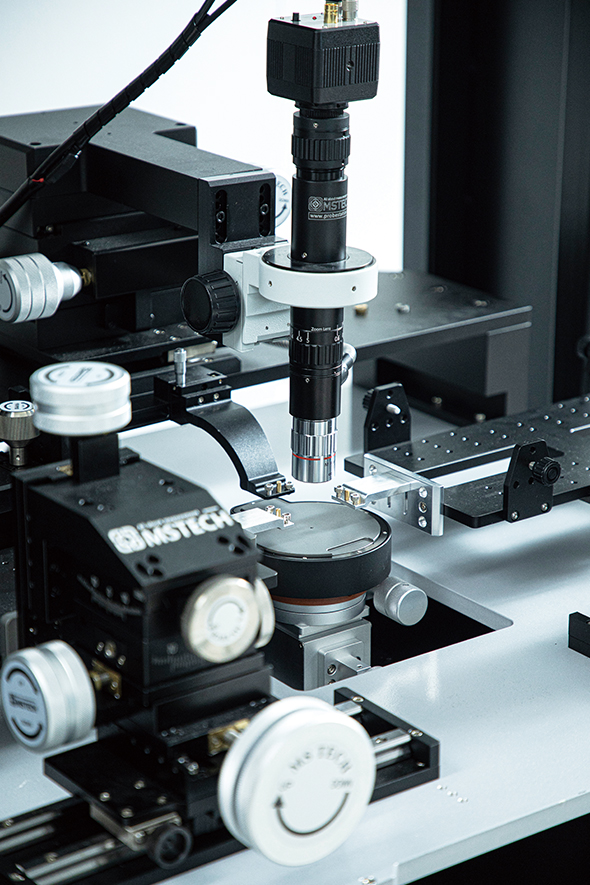
AI 시대를 대비하는 ‘인공지능반도체대학원 사업’
“인공지능반도체대학원 사업의 핵심은 미래 AI 반도체 분야를 선도할 고급 인재 육성에 있습니다. 사업 공모 당시 국내에서 내로라하는 대학 14곳이 지원했는데, 최종적으로 우리 한양대와 서울대학교, 한국과학기술원(KAIST) 세 곳만 선정됐어요. 연구장비와 같은 인프라 구축비, 인건비, 연구활동비, 산학 연계 프로젝트 실습비, 글로벌 연구 교육비 등으로 연 30억 원씩, 총 164억 원의 사업비가 투입되는 대형 프로젝트입니다.”
한양대 일반대학원 인공지능반도체공학과 주임 정재경 교수는 2029년까지 AI 시대를 이끌 석‧박사급 인재 165명 이상을 배출할 계획이라고 밝혔다. 반도체 소자와 설계를 전공하는 학생들이 AI 프로그램을 잘 다루도록, 또는 AI 프로그램을 전공하는 학생들이 반도체 소자와 설계를 잘 이해하도록 교과과정을 알고리즘, 설계, 소자로 구성했다. 초저전력, 메모리, 시스템, 뉴로모픽 등의 핵심기술과 자기주도적 창의자율 연구, 산학 연계 연구 등 실용적인 교육과정으로 경쟁력 있는 반도체 인재를 양성한다는 방침이다.
“우리 인공지능반도체대학원은 뛰어난 교수진을 자랑합니다. 융합전자공학부, 인공지능학과, 신소재공학과 소속 우수 교수들이 AI 알고리즘, 반도체 소자·공정·설계 등의 전문지식과 실무 역량을 갖춘 인재를 육성하죠. 2023년 9월 개원 당시 18명이었던 교수진은 2025년 3월 현재 24명으로 늘었습니다. 컴퓨터하드웨어, AI 응용 분야 교원을 집중 보완해 교육과 연구의 질을 더 높였습니다.”
한양대 인공지능반도체대학원의 남다른 점은 또 있다. 삼성전자, LG AI연구원, KT, SK텔레콤, 네이버, 카카오, SK하이닉스, 퀄컴코리아 등 국내 유수의 기업들과 협력하며 IC-PBL 형태의 교과목을 운영하는 것이다. 학생들은 산업 현장의 문제를 직접 해결하는 실습형 교육을 통해 실무 역량을 배양하게 된다. 더불어 학생들이 시야를 넓히도록 위스콘신 대학교, UC 버클리 등 미국 우수 대학 및 기업에 6개월 이상 장기 파견하거나 국제 공동연구 프로젝트에 참여할 기회를 준다.
또한 다이아몬드플러스(D+) 장학금 대상 학과로서 석·박사 과정생 100% 등록금 면제, 석사 과정생 70% 등록금 면제 혜택을 제공하는데, 모교 출신뿐 아니라 타교 출신 학생에게도 동일 혜택을 적용한다. 이 때문에 높은 경쟁률을 보일 뿐 아니라 학생들의 우수성 역시 최고 수준을 기록하고 있다. 현재 모교 출신 대학원생 비율은 65%, 석·박사통합 과정 비율은 56% 수준. 타교 출신이나 석·박사통합 과정생 비율이 높은 것 모두 이례적이다. 이는 한양대가 학교의 단기 성과가 아닌, 우리 사회에 꼭 필요한 인재 양성에 진심을 다한다는 방증이기도 하다.
“AI 반도체 시장은 글로벌 패권 경쟁의 핵심 전장으로 부상했습니다. 현재 미국, 중국, 대만, 유럽, 그리고 우리나라 등이 이 분야를 선도하고 있어요. 특히 미국이 압도적 우위를 차지하고 있습니다. 미국은 엔비디아, 구글, AMD, 퀄컴, 인텔, 테슬라 등 세계적인 빅테크 기업을 보유하고 AI 반도체 연구 및 개발에서 가장 앞선 상태입니다. 엔비디아의 시가총액은 2014년까지만 해도 삼성전자의 10% 수준이었지만, 2024년에는 삼성전자의 3~4배에 달하는 약 2400조 원을 기록하며 세계 1위 기업으로 성장했어요.”
정재경 주임 교수는 엔비디아의 이런 급성장이 AI 반도체인 GPU 시장을 선점한 전략 덕분이라고 설명했다. 우리나라는 메모리 반도체 강국으로 AI 반도체의 HBM(고대역폭 메모리) 시장을 선도하고 있다. 삼성전자와 SK하이닉스가 HBM3E 등의 차세대 HBM 제품을 엔비디아, AMD, 구글 등 AI 칩 제조사에 독점 공급하며 시장을 주도하는 상황이다.
“SK하이닉스는 현재 글로벌 HBM 시장 점유율 1위로 기술경쟁력을 확보하고 있습니다. 하지만 AI 연산용 프로세서에서는 글로벌 선도 기업에 비해 부족한 실정입니다. 삼성전자, 리벨리온, 퓨리오사 등이 자체 AI 반도체 개발에 나서고 있으나 설계 자산 기반이 약하고 GPU 및 AI 가속기 분야의 설계 경쟁력이 미흡하죠. AI 반도체 하드웨어의 핵심인 GPU, HBM 패키징 기술도 대만의 TSMC사에 비해 열위에 있어요. 이를 극복하기 위해서는 정부 차원의 적극적인 R&D 투자, 설계/패키징 전문 기업 및 인재 육성, AI 반도체 전용 소프트웨어/패키징 플랫폼 개발, AI 인프라 구축 지원이 필수적입니다.”
“AI Semiconductor Specialized Graduate School Project” to Prepare for the AI Era
“The key of the AI Semiconductor Graduate School Project is to train outstanding talents who will lead the future AI semiconductor field. When the project was announced, 14 of Korea’s top universities applied, but ultimately, only Hanyang University, Seoul National University, and Korea Advanced Institute of Science and Technology (KAIST) were selected. This is a large-scale project with a total budget of 16.4 billion KRW, with 3 billion KRW allocated annually for infrastructure development costs such as research equipment, personnel expenses, research activity costs, industry-academia collaboration project training expenses, and global research education expenses.”
Jae Kyeong Jeong, Department Chair of the Department of Artificial Intelligence Semiconductor Engineering at Hanyang University’s Graduate School, announced plans to produce more than 165 master’s and doctoral-level talents to lead the AI era by 2029. The curriculum is structured to ensure that students majoring in semiconductor devices and design can proficiently handle AI programs, and conversely, that students majoring in AI programs can thoroughly understand semiconductor devices and design. The program focuses on key technologies such as ultra -low power, memory, systems, and neuromorphic computing, as well as selfdirected creative research and industry-academia collaborative research, to train competitive semiconductor professionals.
“Our Artificial Intelligence Semiconductor Graduate School boasts an outstanding faculty. Based on faculty members from the Department of Electronic Engineering, the Department of Artificial Intelligence, and the Department of Materials Science and Engineering, we train talents equipped with expertise and practical skills in AI algorithms, semiconductor devices, processes, and design. When the school was established in September 2023, there were 18 faculty members, and as of March 2025, there are now 24 faculty members. We have secured faculty members specialized in computer hardware and AI application fields to further enhance the quality of education and research.”
Hanyang University Graduate School of Artificial Intelligence Semiconductor Engineering has another distinctive feature. It collaborates with leading domestic companies such as Samsung Electronics, LG AI Research, KT Corporation, SK Telecom, Naver, Kakao, SK Hynix, and Qualcomm Korea to offer industry-coupled problembased learning (IC-PBL) courses. Students develop practical skills through hands-on education by directly solving industry-related problems. Additionally, they are given opportunities to broaden their perspectives by participating in long-term dispatch programs of six months or more at prestigious U.S. universities and companies, such as the University of Wisconsin-Madison and UC Berkeley, or by engaging in international joint research projects.
In addition, as a Diamond Plus (D+) department, it offers a 100% tuition waiver for Ph.D. students and a 70% tuition waiver for master’s students, applying the same benefits to students from other universities as well as its own alumni. This not only results in high competition but also ensures that the students are of the highest qualification. Currently, 65% of graduate students are from Hanyang University, and 56% are enrolled in the integrated master’s and Ph.D. program. The high proportion of students from other universities and those in the integrated program is unusual. This demonstrates Hanyang University’s commitment to training essential talents for society rather than focusing solely on short-term institutional achievements.
“The AI semiconductor market has emerged as a key battleground in the global power competition. Currently, the United States, China, Taiwan, Europe, and South Korea are leading this field. In particular, the United States holds an overwhelming advantage. The United States is at the forefront of AI semiconductor research and development, possessing global big-tech companies such as NVIDIA, Google, AMD, Qualcomm, Intel, and Tesla. NVIDIA’s market capitalization was only about 10% of Samsung Electronics’ in 2014, but by 2024, it had grown to approximately 2,400 trillion KRW, three to four times that of Samsung Electronics, making it the world’s leading company.”
Department Chair Jae Kyeong Jeong explained that NVIDIA’s rapid growth was due to its strategy of dominating the AI semiconductor GPU market. Korea, as a powerhouse in memory semiconductors, is leading the HBM (High Bandwidth Memory) market in AI semiconductors. Samsung Electronics and SK Hynix are leading the market by exclusively supplying next-generation HBM products such as HBM3E to AI chip manufacturers like NVIDIA, AMD, and Google.
“SK Hynix currently holds the No. 1 market share in the global HBM market, securing its technological competitiveness. However, in AI computing processors, it falls short compared to global leading companies. Samsung Electronics, Rebellion, and Furiosa are developing their own AI semiconductors, but they have a weak design asset base and lack design competitiveness in the GPU and AI accelerator sectors. The key AI semiconductor hardware technologies, such as GPU and HBM packaging, are also inferior compared to TSMC. To overcome this, proactive governmentlevel R&D investment, promoting specialized design/packaging companies and talent, developing dedicated AI semiconductor software/packaging platforms, and supporting AI infrastructure development are essential.”
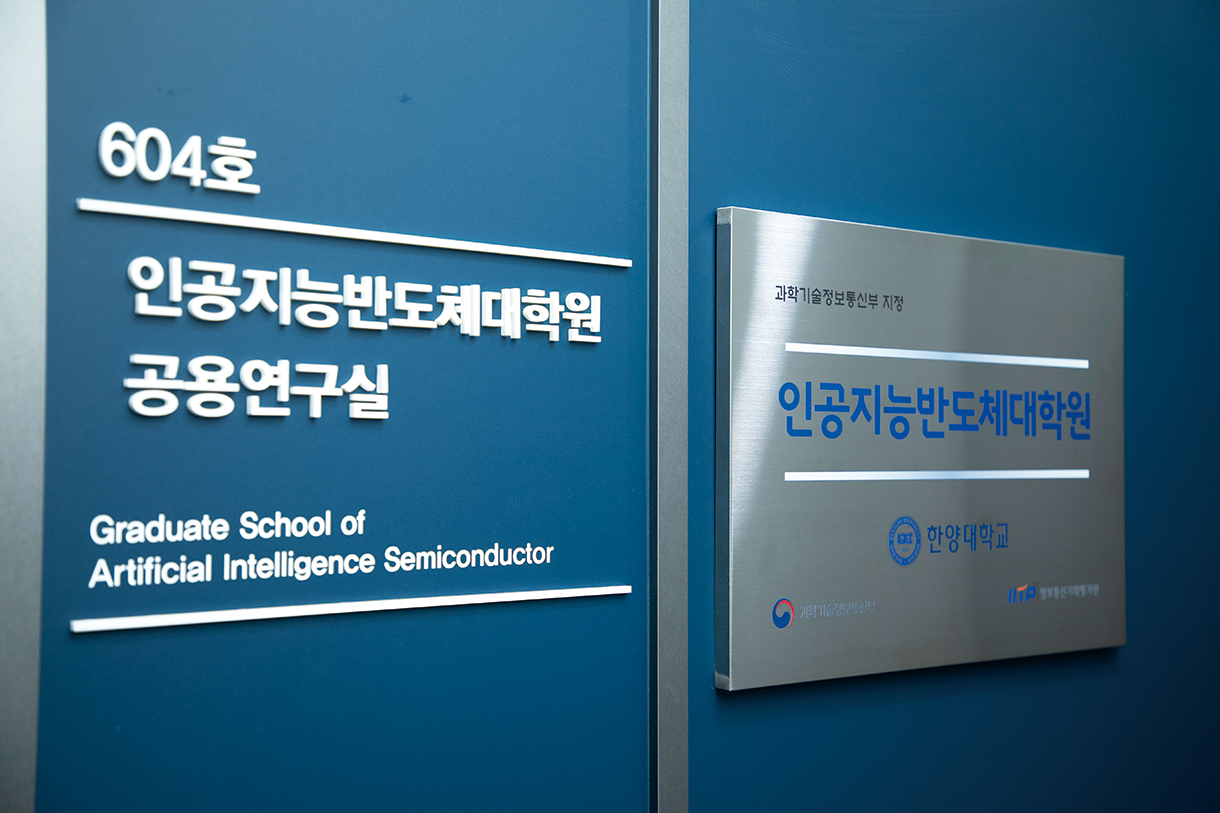
한양대 인공지능반도체대학원은 뛰어난 교수진과 체계화된 교육과정, 전폭적인 학생 지원을 통해 AI 반도체 분야를 선도할 핵심 인재를 양성한다
Hanyang University Graduate School of Artificial Intelligence Semiconductor Engineering trains key talents who will lead the AI semiconductor field through an outstanding faculty, a structured curriculum, and comprehensive student support.
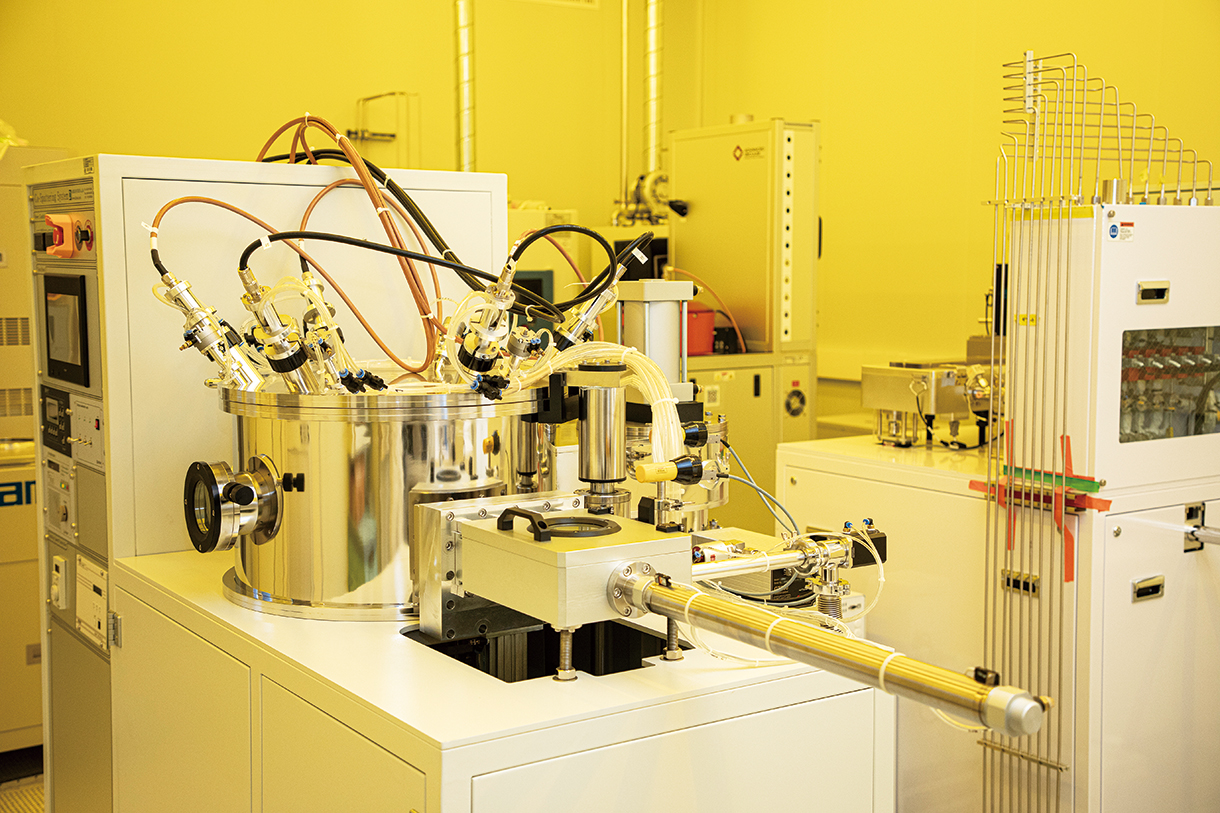
창의적이고 도전적인 AI 반도체 인재가 중요
올해 1월 21일 도널드 트럼프 대통령은 AI 산업에 대규모 투자 단행을 발표했다. 오픈AI와 오라클, 소프트뱅크가 새로운 AI 합작법인 ‘스타게이트’를 설립하고, 미국 내 데이터센터 설립과 인프라 개발에 우선 144조 원, 향후 4년간 약 720조 원을 투입한다는 것이다. 이는 사상 최대의 AI 인프라 프로젝트로 미국이 AI 산업을 장악하는 발판이 될 전망이다. 하지만 아직 최종 승자는 결정되지 않았다. 치열한 경쟁과 도전 속 새로운 기회가 남아 있다.
정재경 주임 교수는 지난 20년간 디스플레이 소자와 반도체 소자 분야를 연구한 전문가다. 특히 실리콘 반도체가 아닌 산화물 반도체 소자를 개발하는데, 이는 최신 스마트폰이나 노트북의 AMOLED 디스플레이에 적용되는 산업적으로 매우 중요한 물질이다. 또 ‘스트레쳐블 디스플레이’ 같은 미래형 디스플레이 기술 연구, D램과 낸드 분야 산학·국책과제 수행뿐 아니라 융합전자공학부 학부장으로서 한양대 SK하이닉스 계약학과 출범을 이끌었다. 우리나라 반도체 경쟁력 제고에 이바지하며 바쁘게 달려온 정재경 주임 교수. 그는 창의적이고 도전적인 핵심 인재를 키워야만 AI 반도체 분야 경쟁력을 확보할 수 있다고 강조했다.
“현재도 많은 졸업생이 국내 IT 대기업에서 활약하고 있지만, 앞으로는 글로벌 빅테크 기업으로 진출하는 사례도 많아지길 기대합니다. 연구 중심 대학의 교수로 자리 잡거나, 스타트업 창업으로 혁신을 이끄는 기업가가 되는 것도 좋겠죠. 선도자(First Mover)가 되려면 창의적이고 도전적인 태도로 연구하고, 혁신적인 개발 역량을 키워야 합니다. 산업 문제를 정확히 정의하고, 적기에 독창적인 해결책을 제시하며, 이를 철저히 검증할 수 있어야 해요. 우리 한양인들이 학문적 호기심, 포기하지 않는 열정, 강인한 인내력을 바탕으로 AI 반도체뿐만 아니라 여러 핵심 산업 발전에 기여하길 기대합니다.”
Creative and Ambitious AI Semiconductor Talents Are the Key
On January 21 of this year, President Donald Trump announced a large-scale investment in the AI industry. OpenAI, Oracle, and SoftBank have established a new AI joint venture, “Stargate,” and plan to invest 144 trillion KRW initially in building data centers and infrastructure in the United States, with a total of approximately 720 trillion KRW over the next four years. This is expected to be the largest AI infrastructure project in history, serving as a foundation for the United States to dominate the AI industry. However, the final winner has not yet been determined. Amid fierce competition and challenges, new opportunities remain.
Department Chair Jae Kyeong Jeong is an expert who has researched display devices and semiconductor devices for the past 20 years. In particular, he develops oxide semiconductor devices instead of silicon semiconductors, which are industrially crucial materials used in AMOLED displays for the latest smartphones and laptops. Additionally, he has led research on future display technologies such as “stretchable displays,” carried out industry-academic and national projects in the fields of DRAM and NAND, and spearheaded the launch of the Hanyang UniversitySK Hynix department (Semiconductor Engineering) as School Director of the Department of Electronic Engineering. Department Chair Jae Kyeong Jeong has been working tirelessly to enhance South Korea’s semiconductor competitiveness. He emphasized that training creative and ambitious key talents is essential to securing competitiveness in the AI semiconductor field.
“Many graduates are already making significant contributions in major domestic IT companies, but I hope to see more of them advancing into global big tech firms in the future. It would also be great if they become professors at research-focused universities or become entrepreneurs leading innovation through startup ventures. To become a first mover, they must conduct research with a creative and ambitious mindset and develop innovative capabilities. It is crucial to accurately define industrial problems, propose original solutions in a timely manner, and rigorously validate them. I hope that Hanyang students, with their academic curiosity, unwavering passion, and strong perseverance, will contribute not only to AI semiconductors but also to the advancement of various key industries.”
